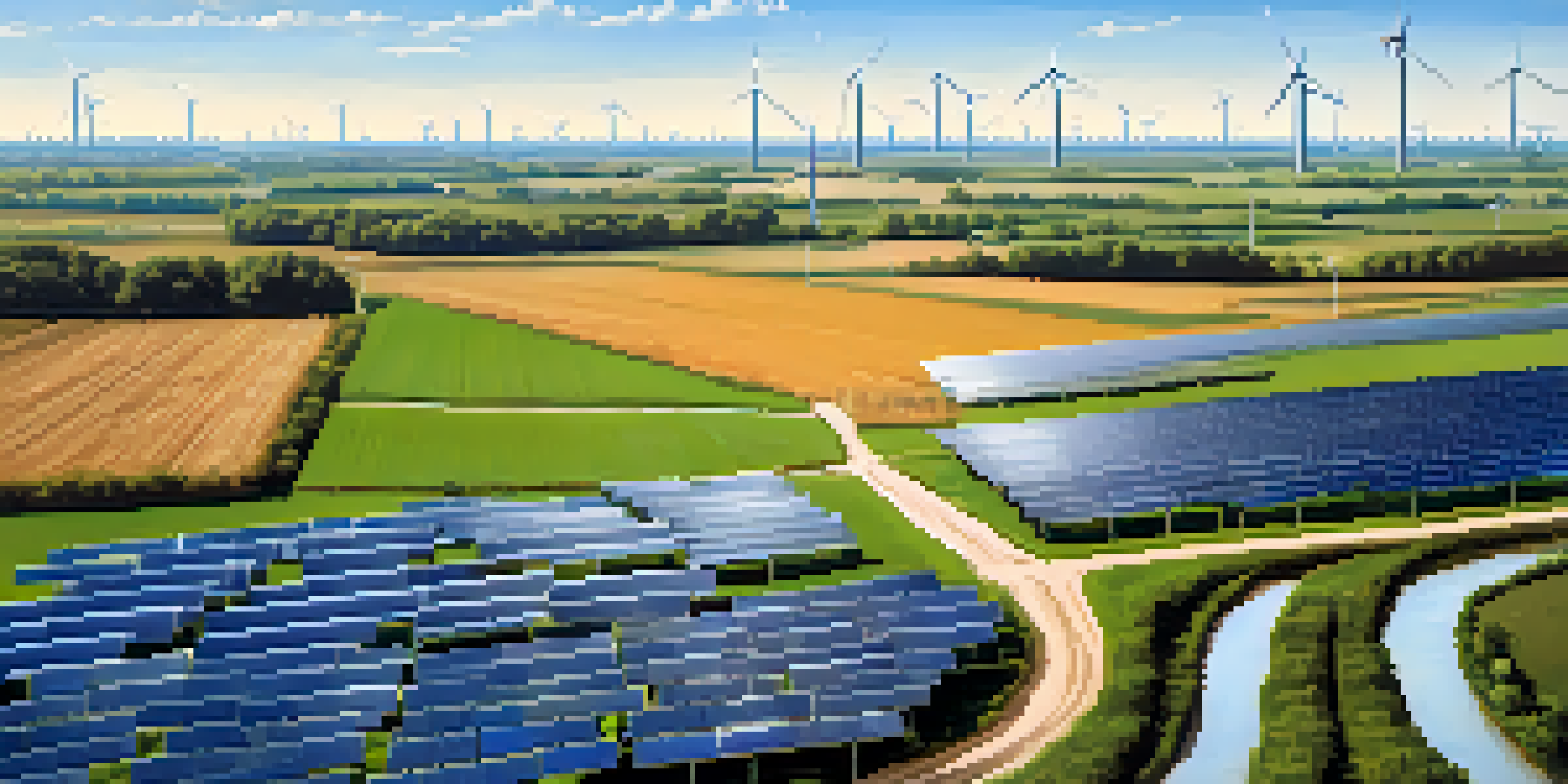Illinois' Role in National Climate Policy and Environmental Justice

Illinois' Historical Context in Environmental Policy
Illinois has a rich history in environmental policy that dates back several decades. The state was one of the early adopters of pollution control measures, setting the groundwork for future legislation. This history has shaped Illinois into a crucial player in national climate discussions, especially as the urgency for action has grown amid climate crisis awareness.
Environmental justice is not just a concept; it’s a movement that seeks to address the inequities and injustices that have been perpetuated through environmental policies.
In the 1970s, the establishment of the Illinois Environmental Protection Agency (IEPA) marked a significant step forward in regulating pollution and protecting natural resources. This agency has been instrumental in implementing federal standards and has often served as a model for other states. The historical commitment to environmental issues has positioned Illinois to lead and influence national climate policies effectively.
Moreover, Illinois' diverse ecosystems, from the prairies to the Great Lakes, highlight the importance of local environmental initiatives. These regions face unique challenges, making localized policy efforts vital. This context not only informs state actions but also provides a foundation for advocating on a national scale.
Key Legislation Driving Climate Action in Illinois
Several key pieces of legislation have defined Illinois' approach to climate action, including the Climate and Equitable Jobs Act (CEJA) enacted in 2021. This comprehensive law aims to achieve 100% clean energy by 2050, setting ambitious targets for renewable energy development. The act represents a significant shift towards sustainability and serves as a model for other states aiming for similar goals.

CEJA also emphasizes job creation in the clean energy sector, focusing on equitable opportunities for communities historically marginalized in energy policy. By prioritizing workforce development, the legislation acknowledges the need for inclusivity in the transition to a clean energy economy. This approach not only combats climate change but also addresses economic disparities.
Illinois Leads in Climate Initiatives
Illinois is a key player in national climate policy, collaborating with other states to drive significant environmental changes.
Additionally, Illinois has taken steps to incentivize renewable energy projects through various tax credits and grants. These financial incentives encourage both businesses and individuals to invest in clean energy technologies. This legislative framework supports a robust green economy while aligning with national climate goals.
Illinois' Role in National Climate Initiatives
Illinois plays a pivotal role in national climate initiatives, often collaborating with other states to enhance collective impact. As a member of the U.S. Climate Alliance, Illinois has committed to reducing greenhouse gas emissions and supporting clean energy solutions. This coalition of states recognizes that climate change knows no borders, and combined efforts can lead to more significant achievements.
The climate crisis is not just an environmental issue; it is a social justice issue that affects marginalized communities the hardest.
The state's participation in regional programs, such as the Regional Greenhouse Gas Initiative (RGGI), further demonstrates its commitment to climate action. Through these initiatives, Illinois works alongside neighboring states to set emissions reduction goals and share best practices. This collaborative spirit amplifies the state's influence in shaping broader climate policies.
Moreover, Illinois' involvement in national conferences and forums allows it to showcase its innovative approaches to climate challenges. By sharing successes and lessons learned, Illinois contributes to a growing body of knowledge that informs policy decisions across the country. This exchange of ideas is crucial for advancing effective climate action on a national scale.
Challenges Facing Illinois in Climate Policy
Despite its proactive stance, Illinois faces several challenges in implementing effective climate policy. One significant hurdle is the political landscape, where differing priorities can hinder consensus on environmental initiatives. This fragmentation can slow progress and create uncertainty for stakeholders invested in clean energy.
Another challenge is the state's dependence on fossil fuels, particularly coal, which has historically been a major part of its energy portfolio. Transitioning away from these energy sources requires not only technological advancements but also a robust plan for economic diversification. Balancing the needs of affected communities is essential to ensure that the transition is just and equitable.
Focus on Environmental Justice
The state's climate strategy emphasizes environmental justice, ensuring marginalized communities are included in clean energy initiatives.
Additionally, climate change impacts, such as extreme weather events, pose immediate threats to the state's infrastructure and public health. These challenges necessitate a comprehensive approach that combines mitigation efforts with adaptation strategies. Addressing these issues head-on is crucial for maintaining momentum in Illinois' climate leadership.
Environmental Justice: A Core Component of Illinois' Strategy
Environmental justice is a fundamental aspect of Illinois' climate policy framework, recognizing the disproportionate impact of environmental issues on marginalized communities. The state has made significant strides in ensuring that all residents have equitable access to clean air, water, and green spaces. This commitment reflects a growing understanding that environmental health and social equity are deeply intertwined.
Programs targeting disadvantaged communities aim to empower residents through education and resources, fostering grassroots involvement in climate initiatives. By prioritizing these voices, Illinois is working to rectify historical injustices tied to environmental degradation. This inclusive approach not only strengthens community resilience but also enhances the overall effectiveness of climate policies.
Moreover, the state's focus on environmental justice has garnered national attention, positioning Illinois as a leader in advocating for equitable climate solutions. This commitment influences federal discussions on environmental policy, showcasing the importance of integrating justice into climate action. As Illinois continues to champion these efforts, it sets a precedent for other states to follow.
Community Engagement in Illinois' Environmental Initiatives
Community engagement plays a crucial role in shaping Illinois' environmental initiatives, emphasizing the need for public participation in policy development. The state actively encourages residents to voice their concerns and ideas, fostering a sense of ownership over local environmental issues. This engagement creates a two-way dialogue that enhances trust and collaboration between policymakers and the public.
Local organizations and grassroots movements are often at the forefront of these engagement efforts, advocating for sustainable practices and policies. By leveraging community knowledge and resources, these groups help to identify specific environmental challenges and potential solutions. This localized approach ensures that policies are tailored to the unique needs of each community.
Community Engagement is Essential
Active community participation shapes Illinois' environmental policies, fostering trust and collaboration between residents and policymakers.
Furthermore, educational programs aimed at raising awareness about climate change and sustainability are integral to community engagement. Workshops, seminars, and outreach campaigns empower residents to take action in their own lives, contributing to broader climate goals. This grassroots involvement not only builds a stronger community but also amplifies the impact of Illinois' environmental initiatives.
The Future of Illinois in Climate Policy and Justice
Looking ahead, Illinois is poised to strengthen its role in national climate policy and environmental justice. With ongoing investments in renewable energy and infrastructure improvements, the state aims to further reduce its carbon footprint while creating job opportunities. This forward-thinking approach positions Illinois as a leader in the transition to a sustainable economy.
The commitment to environmental justice will continue to guide Illinois' strategy, ensuring that all communities benefit from climate initiatives. By prioritizing equitable access to resources and opportunities, the state aims to address historical inequities and build a more inclusive future. This focus on justice will remain essential as climate impacts become increasingly pronounced.

Ultimately, Illinois' proactive measures and collaborative efforts can serve as a blueprint for other states grappling with similar challenges. As the state embraces innovation and community engagement, it can inspire a collective movement towards effective climate action. The journey ahead is pivotal, but Illinois is well-equipped to navigate the complexities of climate policy and environmental justice.